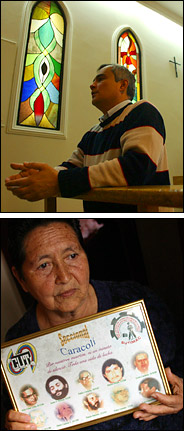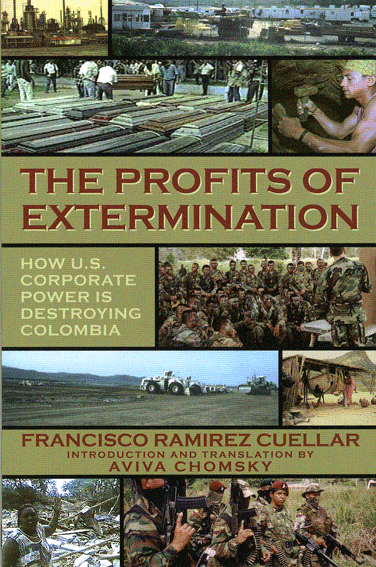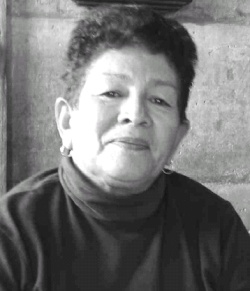
Photographs by Scott Dalton for The New York Times
Francisco Ramirez, top, a union leader in Colombia, prayed in a small chapel at the Bogota airport before boarding a flight to Miami, where he will seek temporary exile. Sixta Tulia Rojas with a poster of her husband and nine other union leaders, all killed.
Assassination Is an Issue in Trade Talks
By JUAN FORERO
Published: November 18, 2004
Copyright 2004 The New York Times Company
Photographs by Scott Dalton for The New York Times
Francisco Ramirez, top, a union leader in Colombia, prayed in a small chapel at the Bogota airport before boarding a flight to Miami, where he will seek temporary exile. Sixta Tulia Rojas with a poster of her husband and nine other union leaders, all killed.
BOGOTA, Colombia, Nov. 17 - With tears in her eyes, 80-year-old Mercedes Cuellar wrapped her arms around her son, one of Colombia's top union leaders, and said goodbye as he boarded a flight to Miami and temporary exile from the country's long conflict.
As the secretary general of the union that represents energy sector workers, Francisco Ramirez had survived seven assassination attempts, including one on Oct. 10. He was still alive, but hundreds of his compatriots, victims of the political assassinations that have been a scourge in this Andean country, have not been so lucky.
"I was so afraid for him that I wanted to see him go to another country," Ms. Cuellar said, dabbing tears as Mr. Ramirez prepared to go through customs on a recent afternoon. "I'm much calmer that he's not here."
As union activists have fallen by the hundreds here, making Colombia the world's most dangerous country for union organizers, their families and those who have dodged assassins' bullets have had little recourse. Practically all killings of union leaders have gone unsolved.
Now, labor rights groups and some members of the United States Congress have promised to do something about the violence and the impunity, using free trade negotiations between Colombia and the Bush administration to prod the government of President Alvaro Uribe to do more to protect union activists and prosecute the killers.
The idea, say labor activists from the A.F.L.-C.I.O. and senior Congressional aides, is to make the issue of violence and impunity as important a component in trade talks as the struggle over agriculture tariffs and intellectual property rights. Its failure to protect union members, the argument goes, gives Colombia an unfair edge over countries that do, like the United States.
"A country should not achieve an unfair comparative advantage by willful omission or noncompliance of labor standards," said Stan Gacek, assistant director of the A.F.L.-C.I.O.'s international affairs department, which works with unions in other countries. "The issue of rights is not an obstruction to trade, it is absolutely essential to the success of trade."
An American trade official, who spoke on condition that he remain anonymous, says that Colombia is obligated to enforce its own labor laws, which guarantee freedom of association and other labor standards.
"And how do I know someone is denied freedom of association?" he said. The murder of trade unionists, the official said, is a violation of freedom of association. "So clearly violence against trade unionists or impunity for killers is an issue with Colombia, and we've told them that."
The pressure is already having an effect.
Trying to mitigate the damage, Vice President Francisco Santos in September traveled to the United States to meet with a bipartisan Congressional group and John J. Sweeney, president of the A.F.L.-C.I.O. "The government has a right to defend its record and that is the reason for my visit, and surely I'll return several times," Mr. Santos said in an interview.
Mr. Santos says that Mr. Uribe's government, which is widely credited with reducing violence since taking office in 2002, has made the country considerably safer for unionists. While 94 were slain last year, 58 had been assassinated as of Tuesday, according to the National Union School, a research and educational center in Medellin. The numbers are still staggering, Mr. Santos acknowledged, but they do represent a marked drop from 1996, when 222 were killed.
The vice president attributes the improvements to a new emphasis on prosecutions and a protection program that has received budget increases of 45 percent, to $13.8 million, since 2001.
Some rights officials, even those long critical of the Colombian government, said that the government had become more responsive to complaints from unionists fearful of being killed.
"I don't think this is a government where you have to make hundreds of phone calls and lobby them to make a serious case," said Jose Miguel Vivanco, who oversees the Americas division of Human Rights Watch, the rights monitoring organization based in New York.
But Mr. Vivanco, other rights leaders and the unionists say that impunity continues largely unabated, despite the government's assurances.
The vice president's figures show that the number of successful prosecutions of assassins - 19 - represents a small fraction of all the cases involving murders of union organizers. Nearly 2,100 union members have been slain since 1991, according to the National Union School.
Union advocates in the United States attribute the decline in violence to a cease-fire that Colombia's main paramilitary coalition, the United Self-Defense Forces, declared in December 2002 before embarking on disarmament talks with the government. The cease-fire has been violated numerous times.
Those paramilitary groups - right-wing, antiguerrilla militias financed by landowners and the cocaine trade - have long targeted unions, accusing their members of being rebels or working with Colombia's two leftist insurgent groups.
Asked about the murders of unionists, Rodrigo Tovar, one of the group's most feared leaders, was adamant about the need to ferret out guerrillas from unions.
"We have always acted against guerrillas, armed or not armed," Mr. Tovar, who commands 5,000 fighters, said last week in an interview on a ranch in northern Colombia. "Our war has been against the subversives, against communist guerrillas, however they are dressed."
Mr. Tovar denied that paramilitaries had worked with companies to eliminate union organizers. But few in Colombia dispute that union leaders have made enemies in the country's highly stratified society, both for their leftist declarations and for their harsh criticism of fiscally conservative governments bent on privatizing industries and holding down labor costs.
Indeed, Mr. Tovar, who was a wealthy landowner and businessman before joining the paramilitaries, could not contain his disdain for unions. He said that they had been "a disaster in Colombia for business" and that union activists were "the ones who sabotage, who hurt companies."
The deaths of union members here, particularly those who work for big foreign multinational companies, has become a thorny international problem for Colombia's establishment and the Bush administration.
Five lawsuits have been filed in American courts accusing companies like Drummond, a coal producer based in Birmingham, Ala., and two bottlers affiliated with Coca-Cola of using paramilitary gunmen to eliminate union organizers. The companies strenuously deny the allegations.
But the lawsuits, filed in American courts under a 215-year-old statute, have put an unwanted spotlight on Colombia's problems and irritated the Bush administration, which argues that they interfere with foreign policy and open multinational companies to sometimes frivolous grievances.
It is just the kind of pressure that union advocates in the United States want to increase, using the trade talks as a way of further prodding the two governments.
"They're looking for levers of pressure," said Michael Shifter, a senior policy analyst who closely follows Colombia for the Inter-American Dialogue, a Washington group. "And it's not surprising as the United States begins negotiations with Colombia on a free trade deal that they're going to explore the possibility of using this as a way of increasing pressure."
Several recent incidents in Colombia have energized union activists in the United States.
In September, the attorney general's office charged three soldiers with having murdered three union activists, an account that sharply contrasted with the army's earlier claim that the unionists were guerrillas killed in a firefight. And earlier this month, an army major escaped - apparently with the help of other military officials - from a military prison where he was serving a 27-year term for the attempted assassination of a union leader.
Mr. Santos, the vice president, said the arrests of the soldiers showed that the government was serious about pursuing the killers of union organizers. The government also quickly fired four military officers at the prison from which the convicted major escaped.
But inaction, union advocates say, is mostly the norm when it comes to the murders of union organizers like Luis Obdulio Camacho, who once headed a cement workers' local in Antioquia province.
Mr. Camacho had lost a son, also a union member, to paramilitary gunmen in 1991. Then, in 1998, he himself was slain; two gunmen shot him in front of several witnesses.
Today, Mr. Camacho's widow, Sixta Tulia Rojas, 69, lives in a small house in Bogota, where she fled to escape her husband's fate. She yearns for justice, but long ago gave up on the government ever making an arrest in the case.
"No one saw anything and that's what's so terrible - the silence," Ms. Rojas said. Pointing to a framed poster of 10 union leaders, including her husband, she said: "Look at that photo. All of them were killed and no one was arrested."
Copyright 2004 The New York Times Company
Posted by nscolombia
at 12:06 PM EST




 Mirian Olivas Jarquin
Mirian Olivas Jarquin